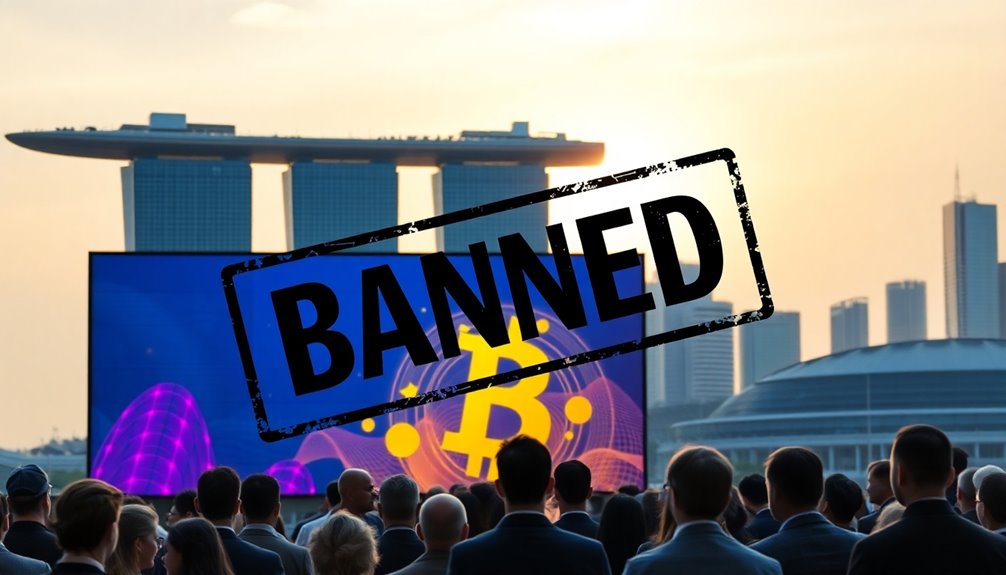Singapore's ban on the crypto-based prediction platform Polymarket underscores its tough stance on unlicensed operators in the gambling and cryptocurrency sectors. Under the Gambling Control Act 2022, platforms like Polymarket fall under strict regulatory scrutiny. This move reflects Singapore's commitment to consumer protection and anti-money laundering measures. As regulations tighten, compliance becomes essential for platforms aiming to operate legally. The ban is part of a broader trend where regulators prioritize market integrity and user safety. If you're curious about the implications of this ban and what it means for the future of crypto platforms, there's more to explore.
Key Takeaways
- Singapore's Gambling Control Act 2022 classifies platforms like Polymarket as unlicensed operators, leading to its ban.
- The Monetary Authority of Singapore regulates cryptocurrency under the Payment Services Act, emphasizing compliance and consumer protection.
- Polymarket's operations were deemed non-compliant with Singapore's strict regulatory framework for gambling and betting.
- The ban reflects Singapore's commitment to safeguarding users and maintaining market integrity amid rising crypto activities.
- Regulatory actions aim to prevent market manipulation and protect consumers from potential scams associated with unlicensed platforms.
Crypto Prediction Market Overview

Crypto prediction markets are innovative platforms where you can speculate on the outcomes of various events, from elections to sports games.
These markets come in several types, including Fixed Odds Betting, Continuous Double Auction (CDA), and Automated Market Maker (AMM) systems.
In event-based trading, you buy and sell contracts tied to specific outcomes, with market values fluctuating based on user trades. Prediction markets are designed to aggregate information on specific topics of interest through crowdsourcing, enhancing the accuracy of forecasts.
Smart contracts on the blockchain determine payoffs automatically, reflecting collective predictions and crowd sentiment.
Some popular platforms include Polymarket, Augur, and PredictIt, each offering unique features.
Singapore's Crypto Regulation Landscape

As the cryptocurrency market evolves, Singapore's regulatory landscape aims to balance innovation with consumer protection. The Payment Services Act (PSA) governs cryptocurrency trading and token usage. The Monetary Authority of Singapore (MAS) issues digital payment token licenses, requiring compliance with specific thresholds. Singapore's framework focuses on anti-money laundering (AML) and consumer protection to ensure a secure environment for users.
Cryptocurrencies are classified as regulated or unregulated, depending on their characteristics, and some may fall under the Securities and Futures Act (SFA). MAS has also introduced stablecoin regulations to guarantee value stability. Advertising restrictions focus on responsible promotion, preventing misleading claims about digital payment tokens.
Betting on Event Outcomes

With Singapore tightening regulations around cryptocurrency activities, it's important to understand how these rules affect prediction markets.
Betting on event outcomes typically involves various types of contracts, like binary options that yield a 0 or 100% result, or event derivatives tied to specific events like elections or sports. These markets use mechanisms such as auction systems or fixed odds betting to facilitate trades. Fixed odds betting has been proposed as a viable alternative to auction-based markets, enhancing prediction accuracy.
Prediction markets excel in aggregating diverse information, enabling participants to make independent decisions.
However, Singapore's Gambling Control Act 2022 classifies platforms like Polymarket as unlicensed operators, leading to penalties for violations.
This regulatory framework considerably impacts the legality and accessibility of betting on event outcomes in the region.
Pros and Cons of Regulation

While regulation can provide essential safeguards for investors, it also raises important questions about privacy and innovation.
On one hand, regulation protects you from fraud, scams, and market manipulation, promoting trust in digital assets. It helps maintain market stability, reducing the risk of abrupt value drops and encouraging the development of stablecoins. As regulations evolve, countries are implementing comprehensive frameworks to ensure consistent oversight of digital assets.
However, it can also decrease user privacy by increasing government monitoring and limiting transaction anonymity. You might face stringent Know Your Customer (KYC) and Anti-Money Laundering (AML) checks, heightening the risk of data breaches.
Additionally, these regulations can stifle innovation, excluding valuable projects and limiting access for those without traditional financial ties, ultimately discouraging new participants from entering the crypto market.
Regulation vs. Innovation Balance

Finding the right balance between regulation and innovation is a growing challenge in the cryptocurrency space.
You'll notice that regulations vary notably across jurisdictions, with places like the EU and US tightening standards. It's vital for regulations to adapt quickly to the evolving nature of virtual assets to avoid stifling progress. Consulting with industry stakeholders can help create practical and effective guidelines. Successful compliance can attract tech-savvy customers who are looking for secure and innovative crypto services. Furthermore, incorporating AI security solutions can significantly enhance the protection of digital assets against emerging threats.
Clear regulations are essential, but they shouldn't impose unnecessary restrictions. Overregulation can hinder innovation and create new vulnerabilities.
International cooperation is key to developing a cohesive regulatory framework that protects consumers while fostering technological leadership in the crypto market.
Ultimately, a balanced approach can encourage growth without compromising safety.
Market Manipulation Concerns

Market manipulation poses significant risks in the cryptocurrency space, impacting both individual investors and the market's overall integrity.
You might encounter various manipulative tactics like pump-and-dump schemes, where false information inflates prices, or spoofing, which involves creating fake orders to sway market prices.
These practices can lead to financial losses and erode your trust in the market. Volatility increases, making it tough to make sound decisions based on deceptive indicators. Market manipulation strategies can exploit vulnerabilities in market structures, compounding the risks for investors.
The anonymity of crypto further complicates detection, allowing manipulators to operate with little fear of repercussions.
As you navigate this landscape, be aware that regulatory scrutiny is growing, which could shape the future of your investments and the platforms you use.
Emerging Regulatory Frameworks Worldwide

As countries grapple with the rapid evolution of cryptocurrency, many are implementing regulatory frameworks to address the unique challenges it presents.
In the US, legislation empowers the SEC and CFTC to oversee the sector, while Brazil has established a licensing regime for virtual asset service providers. Global regulatory frameworks are being developed as governments seek to create consistency due to the cross-border nature of crypto markets. This necessity for regulation echoes similar needs in sectors such as Gold IRAs, where transparency and compliance are paramount.
In Britain, companies offering digital currencies must obtain authorization from the FCA, and regulations for stablecoins are in the works.
Singapore's ban on Polymarket reflects its strict gambling laws, and South Korea registers exchanges with the KFIU, banning privacy coins.
Each country is taking distinct approaches, from El Salvador's embrace of Bitcoin as legal tender to Colombia's banking ban on Bitcoin transactions, highlighting the diverse landscape of global cryptocurrency regulation.
User Education and Awareness

With the rapid changes in cryptocurrency regulations worldwide, understanding the landscape becomes increasingly important for users. You can enhance your knowledge through video tutorials and webinars offered by exchanges like Binance Academy and Coinbase Learn. These platforms provide free courses that cover everything from blockchain fundamentals to advanced trading strategies. Engaging in crypto communities on Telegram and Discord allows you to ask questions and learn from others' experiences. Participating in gamified learning, like Coinbase Earn, rewards you with crypto for completing educational content. Additionally, specialized programs for institutional investors promote informed decision-making and help users avoid scams. By prioritizing education and awareness, you'll navigate the crypto space with confidence and security. Increased trust in educational initiatives can further empower users to make informed choices.
Frequently Asked Questions
How Does Polymarket Operate Within the Crypto Ecosystem?
Polymarket operates as a decentralized prediction market where you can trade shares on the likelihood of future events.
You deposit USDC cryptocurrency and participate in various markets, from political outcomes to economic indicators.
Using the Polygon blockchain, it guarantees transparent transactions through smart contracts.
You can buy or sell shares anytime before an event concludes, with market prices reflecting the current probabilities.
This dynamic environment makes it an engaging platform within the crypto ecosystem.
What Penalties Does Singapore Impose for Operating Banned Platforms?
If you're caught operating banned platforms in Singapore, you could face serious penalties.
Fines can reach up to 10,000 Singapore dollars under the Gambling Control Act. For repeat offenses, imprisonment can last up to six months. Sometimes, you might even face both fines and jail time.
The Singapore Police Force actively enforces these laws, ensuring that unauthorized gambling activities are strictly monitored and punished.
Are There Alternative Platforms for Crypto Prediction in Singapore?
If you're looking for alternative platforms for crypto prediction in Singapore, several options are worth exploring.
Platforms like OKX and Gemini offer advanced trading tools and a variety of cryptocurrencies. You'll find user-friendly interfaces and robust security measures that prioritize your safety.
Plus, many of these platforms provide educational resources to help you make informed decisions. With competitive fees and responsive customer support, you'll have a solid experience trading crypto.
How Can Users Protect Their Investments From Regulatory Changes?
To protect your investments from regulatory changes, you should stay informed about the latest regulations and market trends.
Diversifying your portfolio across various crypto assets can help mitigate risks.
Implement robust compliance programs to monitor any regulatory shifts, and consult with experts when needed.
Regularly review your investments and adjust your strategies accordingly.
What Impact Does the Ban Have on Crypto Innovation in Singapore?
The ban on certain crypto platforms considerably stifles innovation in Singapore.
You'll find that strict regulations create hurdles for developers and investors alike, limiting access to new technologies and services.
With fewer options available, the growth of crypto-based solutions slows, and steering compliance becomes more complex.
This uncertainty can deter potential investors and innovators, making it difficult to explore the full potential of blockchain technology in a rapidly evolving market.
Conclusion
In summary, Singapore's ban on Polymarket highlights the ongoing tension between regulation and innovation in the crypto space. While it aims to protect users and prevent market manipulation, it's vital for regulators to strike a balance that fosters growth without compromising safety. As global frameworks evolve, staying informed and aware is essential for both users and industry players. Embracing education can help navigate these complex waters and encourage a healthier, more responsible crypto ecosystem.








